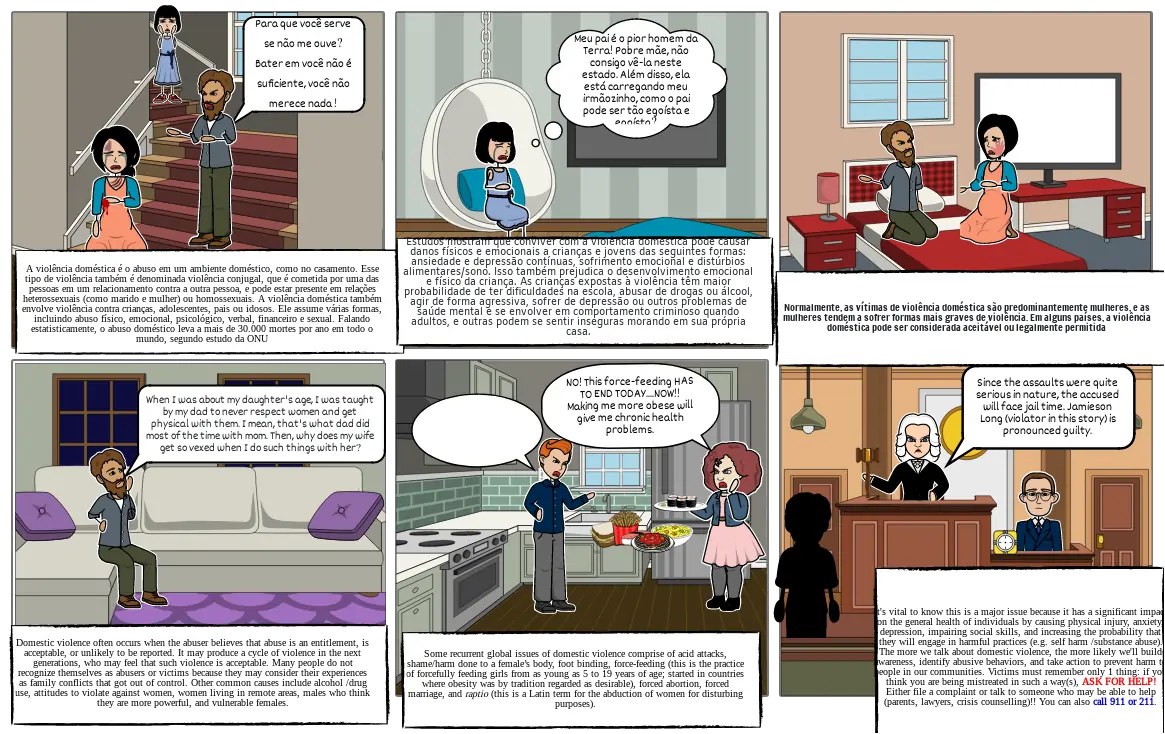violência doméstica

Storyboard Text
- A violência doméstica é o abuso em um ambiente doméstico, como no casamento. Esse tipo de violência também é denominada violência conjugal, que é cometida por uma das pessoas em um relacionamento contra a outra pessoa, e pode estar presente em relações heterossexuais (como marido e mulher) ou homossexuais. A violência doméstica também envolve violência contra crianças, adolescentes, pais ou idosos. Ele assume várias formas, incluindo abuso físico, emocional, psicológico, verbal, financeiro e sexual. Falando estatisticamente, o abuso doméstico leva a mais de 30.000 mortes por ano em todo o mundo, segundo estudo da ONU
- Para que você serve se não me ouve? Bater em você não é suficiente, você não merece nada !
- Estudos mostram que conviver com a violência doméstica pode causar danos físicos e emocionais a crianças e jovens das seguintes formas: ansiedade e depressão contínuas, sofrimento emocional e distúrbios alimentares/sono. Isso também prejudica o desenvolvimento emocional e físico da criança. As crianças expostas à violência têm maior probabilidade de ter dificuldades na escola, abusar de drogas ou álcool, agir de forma agressiva, sofrer de depressão ou outros problemas de saúde mental e se envolver em comportamento criminoso quando adultos, e outras podem se sentir inseguras morando em sua própria casa.
- Meu pai é o pior homem da Terra! Pobre mãe, não consigo vê-la neste estado. Além disso, ela está carregando meu irmãozinho, como o pai pode ser tão egoísta e egoísta?
- Normalmente, as vítimas de violência doméstica são predominantemente mulheres, e as mulheres tendem a sofrer formas mais graves de violência. Em alguns países, a violência doméstica pode ser considerada aceitável ou legalmente permitida
- Domestic violence often occurs when the abuser believes that abuse is an entitlement, is acceptable, or unlikely to be reported. It may produce a cycle of violence in the next generations, who may feel that such violence is acceptable. Many people do not recognize themselves as abusers or victims because they may consider their experiences as family conflicts that got out of control. Other common causes include alcohol /drug use, attitudes to violate against women, women living in remote areas, males who think they are more powerful, and vulnerable females.
- When I was about my daughter's age, I was taught by my dad to never respect women and get physical with them. I mean, that's what dad did most of the time with mom. Then, why does my wife get so vexed when I do such things with her?
- Some recurrent global issues of domestic violence comprise of acid attacks, shame/harm done to a female’s body, foot binding, force-feeding (this is the practice of forcefully feeding girls from as young as 5 to 19 years of age; started in countries where obesity was by tradition regarded as desirable), forced abortion, forced marriage, and raptio (this is a Latin term for the abduction of women for disturbing purposes).
- Speed up, Laura!! You still have all this food to eat.
- NO! This force-feeding HAS TO END TODAY....NOW!! Making me more obese will give me chronic health problems.
- It's vital to know this is a major issue because it has a significant impact on the general health of individuals by causing physical injury, anxiety, depression, impairing social skills, and increasing the probability that they will engage in harmful practices (e.g. self harm /substance abuse). The more we talk about domestic violence, the more likely we'll build awareness, identify abusive behaviors, and take action to prevent harm to people in our communities. Victims must remember only 1 thing: if you think you are being mistreated in such a way(s), ASK FOR HELP! Either file a complaint or talk to someone who may be able to help (parents, lawyers, crisis counselling)!! You can also call 911 or 211.
- Since the assaults were quite serious in nature, the accused will face jail time. Jamieson Long (violator in this story) is pronounced guilty.
Over 30 Million Storyboards Created
No Downloads, No Credit Card, and No Login Needed to Try!
